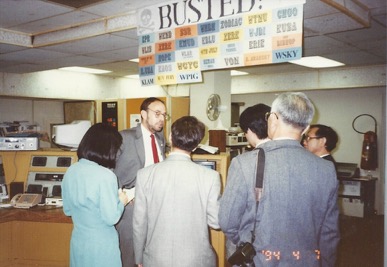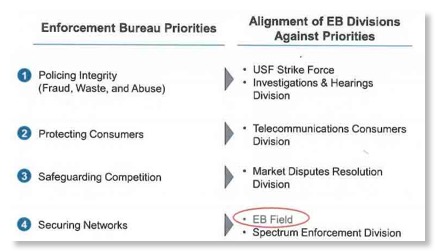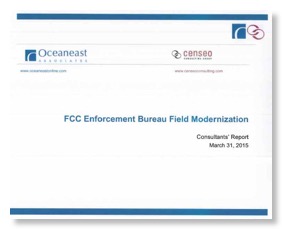Commissioners Rosenworcel & O'Rielly Remarks on Techonomy Spectrum Panels
When FCC was Serious About Spectrum Enforcement

In searching through some old photos your blogger found the above picture of the “Comm Room”, the 24/7 command post of Enforcement Bureau’s predecessor, FOB. The photo is dated 1994 and is at the former 1919 M St., NW location of FCC. Your blogger is showing around some visitors from the FCC’s Japanese counterpart and was not responsible for the operation of this facility - rather at this time during his “exile” resulting from the 1985 Wi-Fi decision when he was responsible for new technology to support spectrum enforcement work.
What was interesting to note is the “BUSTED” sign showing 27 pirate radio operations that had been closed down in recent months as part of a friendly contest between the enforcement regions. Pirates often operate at night and on weekends and overtime is needed to chase them. Travels costs of also needed in many cases. Is FCC interested in chasing and closing, let alone prosecuting, private radio station these days? It does not appear that they are!
Briefing on FCC Consultant Report
on Spectrum Enforcement Downsizing
This is why spectrum enforcement costs more per FCC employee than processing clerks in Gettysburg. Note that police and fire personnel cost more to local governments than marriage bureau clerks: like spectrum enforcers that need “special toys”, they need vehicles, they need more space than clerks, they need multiple offices to be able to respond to events in a timely way. Police need special cars, weapons and other specialized equipment. Fireman also need fire trucks, fire houses near the areas they protect, and specialized equipment - ever watch Chicago Fire? Who would think of a direct comparison of such costs to office-based employees.
Of course, slide 2 of the briefing shown above shows that EB had already made spectrum enforcement its 4th and lowest priority before they even considered downsizing:

Slide 2 from briefing on consultant report
The report finds that “only 40% of Field time address RF spectrum enforcement” - Slide 11. Did they ever ask firemen how much time they spent actually putting out fires?
The report envisions “Equipment that meets the needs of the Field to resolve matters timely and efficiently” - Slide 18. Do the authors and the Commission realize that technical equipment - for both enforcement and the OET Lab - historically has been an afterthought in FCC budgeting? The pending FY 2016 budget request, before Congress no doubt cuts it, calls for $121,920 for OET and $167,132 for EB in equipment purchases. While some extra money is usually added just before the end of each fiscal year, such last minute spending is severely restricted due to procurement issues and certainly does not allow for equipment customized for FCC enforcement. Look at the current Keysight (formerly Agilent/H-P) website prices and you will see that this type of money doesn’t go very far. (If FCC buys equipment that DoD is buying in large quantities, then the price might be 30% less by “riding the contract”. But this then limits equipment selection choices.)
How much money has EB been spending to develop new spectrum enforcement techniques? How much does it plan to spend if the downsizing is approved? It is ironic that when I worked in the old FOB it received funding from other agencies for special shortwave monitoring such as surveillance of Soviet jamming of Voice of America. This funding was then used to develop new technical enforcement methods of value to both FCC enforcement and the sponsoring agency. However, with the creation of the Public Safety and Homeland Security Bureau, the short wave mission was split from EB and hence that source of money for technique development dried up.

Slide 19
With such a tiny budget how practical are “beneficial partnerships”? Should the real focus be “mobility solutions”? In the real world there are a lot of interference complains to public safety that are very intermittent but very troubling. The circa 1991 case at Roanoke VA airport comes to mind as a individual used a VHF aeronautical radio to give orders to aircraft while they approached the airport late at night every few days. The key to solving such cases is to collect data verify the presence of the illegal emissions and to start narrowing down the location of the source. Many of these initial reports of interference turn out to be false due to equipment malfunctions, unusual radio propagation, or operator confusion. So the ability to get equipment to an area quickly and leave it there under remote control is important for both confirmation and data collection on approximate location area and technical characteristics of the interference source that can be used for evidence uncivil or criminal enforcement. (We note that its has been more than a decade since EB has been involved in any criminal prosecutions related to spectrum enforcement - perhaps consistent with the low priority above.) Sending multiple people to do the final tracking is not cost-effective unless you are certain the problem is real, know the modus operandi and typical times of occurrence, and have evidence that can be used in enforcement actions to document illegal transmissions.
The study correctly noted that broadcaster public files are now online - meaning that onsite inspections of such files are not needed. Actually over the years, many field functions have been eliminated or moved to other parties including amateur license exams and most ship inspections. This generally has been done with legislation. Oddly, the study feels tower lighting and marking inspections are no longer important. While it unclear why Congress ever tasked FCC with enforcing tower marking and lighting on FCC licensed antennas - in most other countries the FAA-equivalent has this jurisdiction - compliance

Consider the Coinjock NC helicopter crash into a new unlit tower that killed 2 people. This results in a $1M payment to the federal government that was the largest FCC penalty ever at the time!
FCC spectrum enforcement has some major problems, but a preemptive slashing of resources is not the solution. More dialogue with the spectrum users is needed. Possibly more enforcement functions can be privatized, but this will require consensus building and new legislation.
Your blogger was active in investigating and prosecuting the satellite jamming incidents of the 1980s. At that time it became clear that there was a long term technical solution to locate satellite interference sources in real time but that the resources needed to implement it was beyond what FCC could ever afford. The former FOB sponsored a multi month dialogue between researchers in this technology and satellite owners and encouraged private funding of the appropriate technology’s development and private operation when it proved successful. This technology is now implemented in the private sector and intentional and unintentional satellite interference is handled routinely without FCC intervention. In some areas, similar privatization may decrease the need for FCC resources, but this $750,000 contractor study does not address this type of issue at all.
UPDATE
Wheeler Maintaining 'Field Presence' in Alaska, Hawaii, Puerto Rico http://t.co/fuNEHyVYBR
— Communications Daily (@Comm_Daily) June 5, 2015As this was being drafted, Communications Daily broke the above news that FCC will maintain a spectrum enforcement “presence” in Alaska, Hawaii, and Puerto Rico. Whether that presence will be one person is not clear. This change indicates how poorly the original plan was thought out!
DHS's IG Investigates and Reports Whether Agency is Doing Its Job
Why Doesn't FCC IG Do the Same?
ABC News Videos | ABC Entertainment News
A breaking news item today is an investigation by the Department of Homeland Security’s Inspector Generals on how well the Transportation Security Agency is doing its statutory mission with respect to passenger screening. The acting head of TSA has already been replaced.
The FCC IG has the exact same statutory mission as the DHS IG.
The law does not differentiate between IGs appointed by the President, mainly Executive Branch IGs, and IGs appointed by some independent agencies. The mission and responsibilities are exactly the same! Yet historically the FCC IG has been content to look at petty malfeasance by junior FCC staffers and USF fraud. Whether the FCC is doing its job seems to be “beyond his pay grade”. Perhaps this is because all FCC IGs have been FCC insiders - perhaps known to the 8th floor not to be “too inquisitive”.
We are now in the middle of a proposed major downsizing of the FCC’s spectrum enforcement operation. A $750,000 outside study apparently found that spectrum enforcement was “inefficient” and morale was terrible. Did any findings in this area come for the FCC IG? Of course not! Look at the most recent FCC IG semiannual report. Other than a series of USF-related fraud issues, the only investigation disclosed specifically is the following:
FCC Employee Time and Attendance Fraud: Substantial Overtime
An employee was alleged to have committed time and attendance fraud including improperly claiming overtime pay, working fewer hours than their tour of duty required, and spending considerable time while on official duty selling personal products. According to the data reviewed by OI Internal Affairs, the employee failed to complete a full tour of duty 72 out of the 78 days or 92% of the time. In addition, forensic review of digital evidence did not substantiate the other claims of inappropriate activity while on official government time. The matter was referred to Bureau management for disciplinary action as deemed appropriate.
Look at the reports the FCC IG has released. Most deal with USF-related issues although two deal with FCC security issues. In efficiency of spectrum enforcement operations? Excessive delays in dealing with petitions files at FCC? Compliance with § 7 of the Comm Act? No time for those issues.
A credible IG would make FCC more credible.
The FCC IG is reportedly investigating now the procedures involved in the Net Neutrality decision. Given his track record, will anyone believe his report?




![Validate my RSS feed [Valid RSS]](valid-rss-rogers.png)

